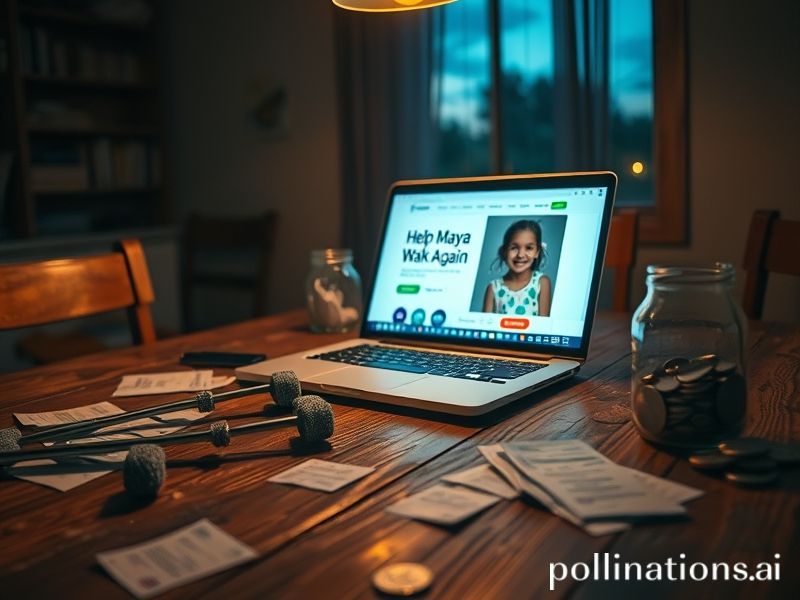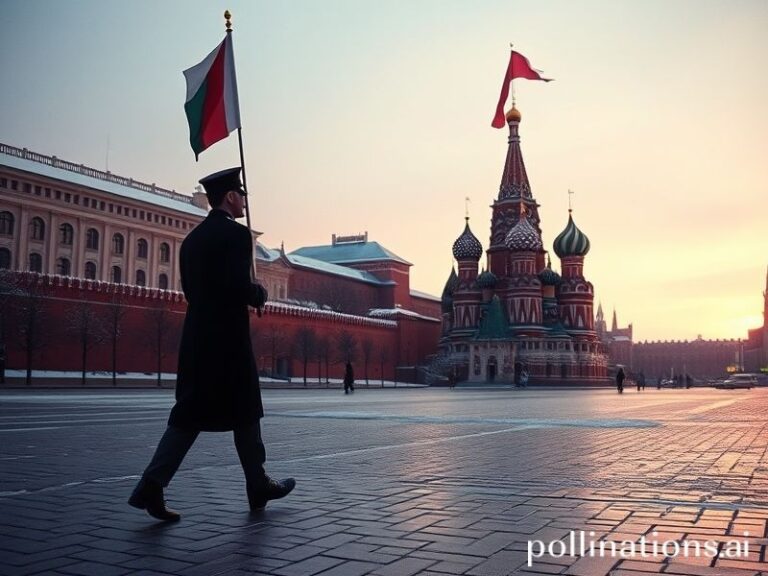GoFundMe: The World’s Largest Shadow Government, Now Accepting Crying Emojis as Policy
The planet’s fastest-growing welfare state doesn’t issue passports, levy taxes, or bother with elections. It’s called GoFundMe, a Silicon Valley startup that has quietly become the de-facto Ministry of Last Resort for the 21st-century human. From Manila to Manchester, when the chemotherapy invoice arrives, the volcano erupts, or the local warlord decides your village is now flammable, the universal reflex is the same: open a browser, upload a tear-jerking photo, and pray the algorithm takes pity.
Officially, the platform is still a “for-profit crowdfunding site.” Unofficially, it’s the world’s largest unregulated insurance market, where premiums are measured in Instagram followers and claims are adjudicated by emoji. Need a new kidney? Hope your TikTok dance goes viral. Hurricane flattened your shack? Better have a photogenic goat in the rubble. The implicit contract is brutally simple: if strangers like your narrative more than the other 50,000 live pitches, you eat; if not, you don’t. Capitalism finally achieved the perfect feedback loop—pity as currency.
Consider the geopolitical elegance. Western governments can slash foreign aid budgets and still sleep at night because GoFundMe is out there patching the holes. After the 2023 Moroccan earthquake, European embassies tweeted condolences while European citizens quietly paid for the bandages. When Greece’s wildfires turned the sky apocalyptic, Athens didn’t ask Brussels for cash; it asked the diaspora to retweet. The platform has become the diplomatic equivalent of a friend who promises to “get the next round” and somehow never does.
Meanwhile, the Global South has weaponized the spectacle. Filipino jeepney drivers crowdfund new engines by livestreaming karaoke marathons; Kenyan farmers plant QR codes next to drought-stricken crops like QR-enabled scarecrows for guilt. In a delicious irony, the same data-harvesting techniques originally perfected to sell sneakers are now used to decide which infant gets heart surgery. Silicon Valley disrupted colonialism by simply automating it.
Then there’s the inflationary spiral of tragedy. A decade ago, $10,000 could save a life; today you need a cinematic drone shot, a verified blue checkmark, and preferably a celebrity cameo. The going rate for a decent cancer campaign in the United States now hovers around $250,000—roughly the price of an actual American election. Foreign disasters, conversely, remain bargain-basement; a collapsed school in Nepal still tugs Western heartstrings for as little as $15,000, proving that exchange rates apply to empathy, too.
Naturally, state actors have noticed. The Kremlin’s troll farms no longer just spread disinformation; they seed rival GoFundMe campaigns to muddy the narrative. China’s consulates allegedly boost donations to overseas Chinese victims while throttling Uyghur equivalents. In Lebanon, political parties run competing campaigns for the same explosion victims, turning grief into a partisan auction. The platform’s fraud filters, designed to catch fake cancer kids from Ohio, buckle hilariously when confronted with entire fake villages in Myanmar.
And yet, for all the moral vertigo, GoFundMe has achieved something the United Nations never managed: a single global safety net stitched together by cat memes and bitcoin. When a bus driver in Bogotá needed insulin last month, donations arrived from 73 countries, including $500 from a software engineer in Seoul who wrote, simply, “I’ve been there, bro.” It is perhaps the purest distillation of human solidarity we have—shamelessly transactional, heartbreakingly sincere, and utterly inadequate to the scale of the problem.
The numbers tell the bedtime story: $25 billion raised since 2010, roughly the GDP of Iceland, spread thin enough to feel like monopoly money. Every donation is simultaneously an act of grace and an admission that the world’s actual systems have failed so completely that begging strangers on the internet counts as progress. We used to march for universal health care; now we just retweet it.
In the end, GoFundMe is not a bug in the global operating system—it’s the patch we settled for when we couldn’t be bothered to write a better one. Until the next update, keep your camera charged and your backstory tight. The invisible hand of the market now holds a begging bowl, and it’s passing it around the planet one click at a time.







